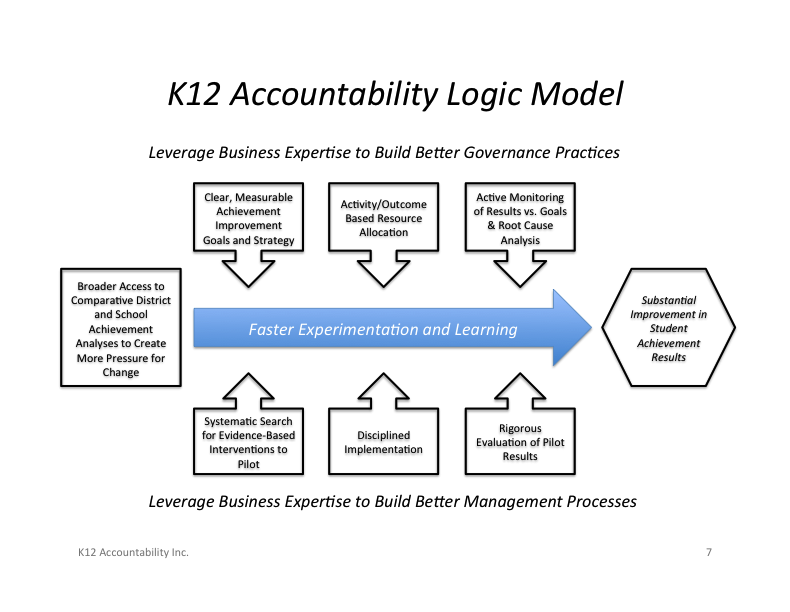Welcome to K12 Accountability. As John F. Kennedy said, "Our progress as a nation can be no swifter than our progress in education. The human mind is our fundamental resource." In today's economy, President Kennedy's words have never been more true.
In his new book, “The Knowledge Capital of Nations”, Stanford’s Rick Hanushek concludes that in today’s digital economy, “long-run economic growth is overwhelmingly a function of the cognitive skills of the population.” Specifically, Hanushek has estimated that improving K12 performance in Colorado could double the size of the state’s GDP. If we want a growing economic pie in the future (which would surely help us to address many of the other problems we face), then we cannot avoid the urgent need to do a much better job of educating our children in the present.
We also know that the forces of globalization and accelerating technology are rapidly raising the bar for our children, in terms of the cognitive and non-cognitive knowledge and skills they must master in order to succeed in the 21st century. If our K-12 school systems don't keep up, our children are guaranteed to struggle, likely for years. And none of us wants that.
But that is exactly the problem we face today. A new bipartisan report from the National Conference of State Legislators put it bluntly: “Most state education systems are falling dangerously behind the world in a number of international comparisons and on our own National Assessment of Educational Progress, leaving the United States overwhelmingly underprepared to succeed in the 21st century economy” (“No Time to Lose”, August 2016).
Our goal is to enable more constructive, urgent, non-partisan, and evidence-based conversations about student achievement improvement in Colorado between business executives, parents, accountability committees, and district leaders.
Our focus is on twelve major suburban school districts along the Front Range, including Academy, Boulder Valley, Cherry Creek, Cheyenne Mountain, Colorado Springs, Douglas County, Falcon, Jefferson County, Lewis Palmer, Littleton, Poudre, and St. Vrain. Together these relatively affluent and suburban districts along the Front Range serve almost 400,000 students, or 45% of all public K-12 students in Colorado, and spend over four billion tax dollars every year.
We publish analyses of comparable district and school level student achievement results and their underlying drivers, summarize key research on achievement improvement issues, provide easy access to rich data sets for others to use, and develop tool sets to facilitate closer, sustained, and substantive collaboration between business groups and school districts to improve key K12 management processes (innovation, implementation, and evaluation), and governance practices (direction setting, resource allocation, and performance monitoring).
More than a decade of working on K-12 performance improvement has taught us (over and over again) that these initiatives, while not sufficient on their own, are necessary for realizing the substantial gains in student achievement results that our state and nation desperately needs.
In his new book, “The Knowledge Capital of Nations”, Stanford’s Rick Hanushek concludes that in today’s digital economy, “long-run economic growth is overwhelmingly a function of the cognitive skills of the population.” Specifically, Hanushek has estimated that improving K12 performance in Colorado could double the size of the state’s GDP. If we want a growing economic pie in the future (which would surely help us to address many of the other problems we face), then we cannot avoid the urgent need to do a much better job of educating our children in the present.
We also know that the forces of globalization and accelerating technology are rapidly raising the bar for our children, in terms of the cognitive and non-cognitive knowledge and skills they must master in order to succeed in the 21st century. If our K-12 school systems don't keep up, our children are guaranteed to struggle, likely for years. And none of us wants that.
But that is exactly the problem we face today. A new bipartisan report from the National Conference of State Legislators put it bluntly: “Most state education systems are falling dangerously behind the world in a number of international comparisons and on our own National Assessment of Educational Progress, leaving the United States overwhelmingly underprepared to succeed in the 21st century economy” (“No Time to Lose”, August 2016).
Our goal is to enable more constructive, urgent, non-partisan, and evidence-based conversations about student achievement improvement in Colorado between business executives, parents, accountability committees, and district leaders.
Our focus is on twelve major suburban school districts along the Front Range, including Academy, Boulder Valley, Cherry Creek, Cheyenne Mountain, Colorado Springs, Douglas County, Falcon, Jefferson County, Lewis Palmer, Littleton, Poudre, and St. Vrain. Together these relatively affluent and suburban districts along the Front Range serve almost 400,000 students, or 45% of all public K-12 students in Colorado, and spend over four billion tax dollars every year.
We publish analyses of comparable district and school level student achievement results and their underlying drivers, summarize key research on achievement improvement issues, provide easy access to rich data sets for others to use, and develop tool sets to facilitate closer, sustained, and substantive collaboration between business groups and school districts to improve key K12 management processes (innovation, implementation, and evaluation), and governance practices (direction setting, resource allocation, and performance monitoring).
More than a decade of working on K-12 performance improvement has taught us (over and over again) that these initiatives, while not sufficient on their own, are necessary for realizing the substantial gains in student achievement results that our state and nation desperately needs.
